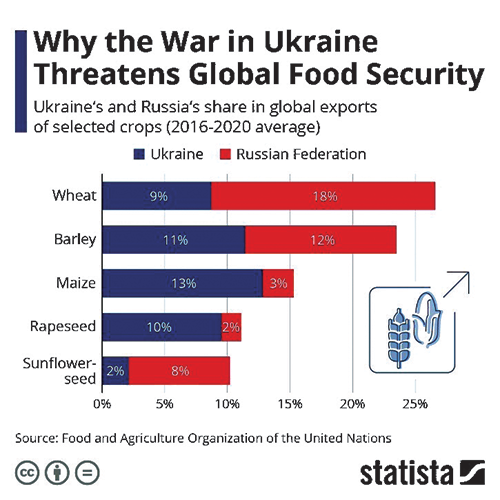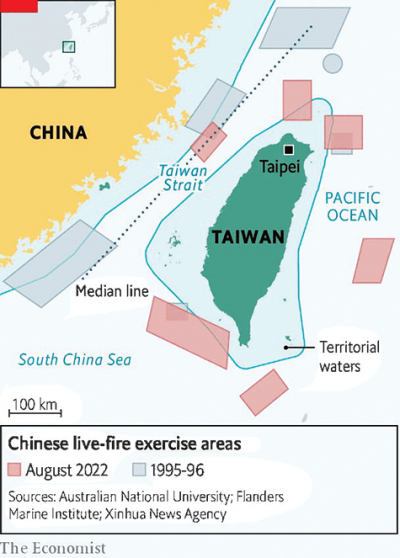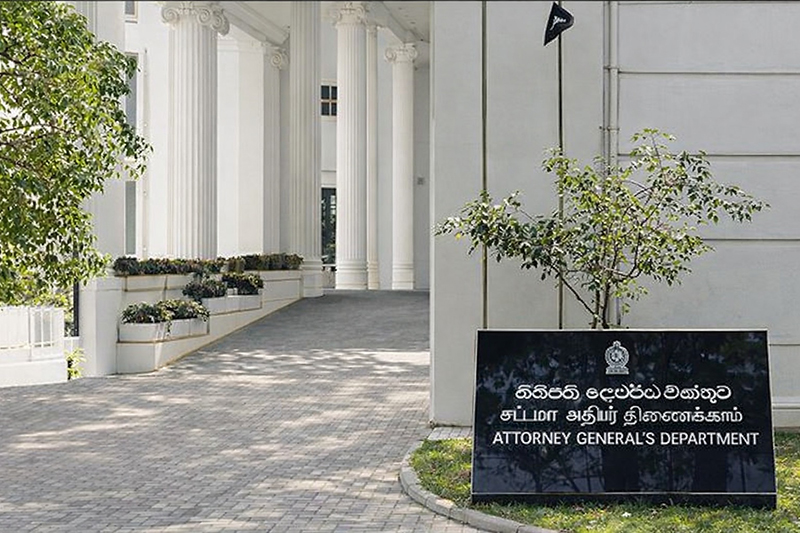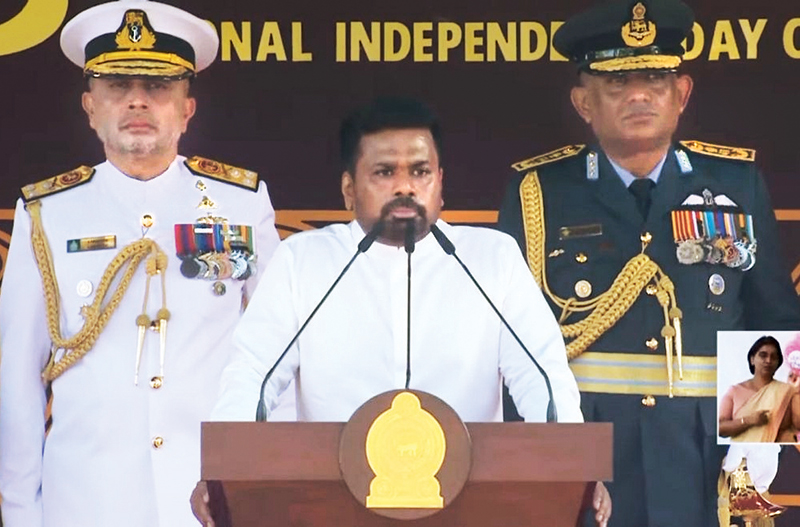Features
Lanka Adrift in Tempestuous Seas

by Kumar David
There are three dangerous global trends. The first is not new, it is the growth of right-wing extremism in the US; the second is more recent and commenced in 2022 with the Russian invasion of Ukraine. The third is the prospect of Sino-US military hostilities. All three will affect this country. Right-wing extremism turned perilous in the US with the election of Donald Trump whose Administration has lived alongside hate groups and an extreme legislative agenda (anti-environmental, anti-feminist, anti-LGBT). In the state of Idaho extremist Ammon Bundy has a chance of being elected State Governor.
America
With disarray in the Democratic Party which fears defeat in mid-term Congressional elections in November and a likely return of Trump to the presidency in 2024, the stage is set for a further drift of the US to right-extremism. Trump seems near certain to be re-elected in 2024 unless convicted of illegalities and barred from contesting. But this may lead to unrest led by the large white working-class base of the Republican Party. It is reasonable to speculate that the United States is on its way, if it happens then for some years only I am sure, to turning right-extremist. What difference will a temporary death of democracy in America mean for midgets like Sri Lanka?
The truthful answer to this is curious; it belongs in the domain of “known unknowns” meaning that we know that the effect could swing in two entirely different ways. The US is the world’s premier military and diplomatic, and one of two leading economic powers. Its influence is large and if it chooses to hound Lanka’s war-criminals and leaders who savaged human-rights it can make life hard for such vermin. On the other hand a right-extremist influenced USA may swing the other way, it could for reasons of its own cut a deal, as it has often done, with the military, leaders who are the scourge of democracy and mass murderers – think Pinochet and dozens of brutal Latin American regimes in the last 50 years.

Russian military losses in Ukraine are huge; some estimate as high as 60,000. (Ukrainian military losses seem to be less than a quarter of this). Both sides are digging in for a cold winter of attrition and trench warfare extending well into 2023; the invasion truly is a gigantic Putin blunder. The Ukraine-Russia policy of zero-integrity Trump’s mongrel hypothetical second Administration, supported by fascist trends in the US can be bizarre. His empathy for Putin, antipathy to NATO and the resemblances of US right-extremism to its European counterparts make outcomes unpredictable. Meanwhile Ukraine’s Zaporizhzhia nuclear plant is under attack by Russian artillery; bombing nuclear power plant is not banned by international law. It’s a dangerous world. Big countries have deep enough financial pockets and sufficient economic resources to mollify their populations, a small country is a hapless skiff adrift on a tempestuous ocean.
Europe
Outcomes seem more predictable in post Ukraine-invasion Europe. Western Europe’s choices are stark. The continent is desperate to minimise dependence on Russian gas, coal and strategic materials – the poor spend an astounding 50% of their income on energy. Germany’s long-term energy plans have come unstuck, the drive to a green future has been reversed. Mothballed coal power stations are to be brought into service and three nuclear power plants that were to be decommissioned have been given a lease of life. This is bad news all round, instability in energy markets is not good for anyone, especially small fry.
Apart from energy dependence, Germany, Europe’s largest economy, is also dependent on Russian metals and minerals as are other European industries to varying degrees. Russia has rich reserves of manganese, chromium, nickel, platinum, titanium and the conventional materials iron ore, copper, tin, lead, tungsten, diamonds, phosphates, and gold. Siberia nurtures one-fifth of the world’s timber. Although Lanka is of miniscule significance, Europe’s desire to keep open international supply chains on which its industries depend will be helpful in our quest to preserve GSP+ benefits.
On other counts too, the post invasion environment is troublesome. Russia is the largest urea exporter; one reason for surging fertilizer prices is prices of natural gas and energy needed in urea production. (As of mid-2022 there were indications that urea prices would decline later this year due to a slow start to seeding in the US). Russia is one of the world’s largest exporters of nitrogenous fertiliser, phosphates and potash. Ukraine and Russia are big food exporters and the imbroglio will lead to higher global food prices. All these concerns affect Sri Lanka agriculture directly and via their effect on world food prices.
Sino-US conflict
The danger of spreading Sino-American conflict is chilling for everybody, especially the countries of East Asia, the Far East and the littoral states of the Indian Ocean. Nancy Pelosi’s high-profile visit to Taiwan at this time was foolish and provocative. Pelosi visited the island in defiance of threats from Beijing which views Taiwan as a breakaway province and warned it would consider the visit a major provocation. It was undertaken entirely in the hope of gaining votes for the Democrats in the November 2022 Congressional elections, which expectation will come to nought. It so incensed China that for the first time it conducted military drills that butted into Taiwan’s territorial waters. Outright Sino-US conflict confined even to this theatre is unlikely because neither side has the appetite to escalate, but the visit has destabilised the region and increased the cost of shipping in East Asia and through the Malacca Straits.
A lot is at stake for Chinese leader Xi Jinping who is making an unprecedented since Mao bid for a third term. Xi who came to power in 2012 placed reunification-with-Taiwan high on his agenda; perhaps he will live to regret it as he will be unable to deliver within any foreseeable time-frame. He may wish to turn to domestic issues but it is hard to see how he can link these to the Pelosi visit. China is plagued by a property crisis, and an economic slowdown due to its strict zero-Covid lockdown. According to Hong Kong’s South China Morning Post there are fifty million empty flats in China which threaten to plunge the property market into chaos. These two factors have provoked protests but Xi will not be able to link them to the Pelosi visit and distract attention away from domestic failures. It is most unlikely that Xi’s grip on power will be challenged at the 2022 Congress in November but his inability to deliver on reunification will make him look weak in the ensuing period – Party Congresses are held every five years. This his third-term is likely to be his last.
China is unable to make a critical building block of the global economy: top of the line silicon chips. It buys 60% of the world’s supply of semiconductors to drive its vast industrial product output; 90% are made outside the country or by foreign companies in China. It spends more buying computer chips than importing oil. But it is struggling to keep up in the technological arms race. Why? Its champion in the foundry industry (makers of integrated circuits) Semiconductor Manufacturing International Corp last year announced plans to build a 28-nanometre chip but this technology is a decade behind TSMC’s 3-nanometer chip. Taiwan Semiconductor Manufacturing Corp is the world’s top chip maker.

TSMC’s dominance ensures Taiwan’s grip on 60% of the global chip business. Furthermore, nine out of the ten outfits which design rather than make chips (“fabless” or non-fabricating outfits), and also drive innovation are US based; the tenth, MediaTek, is Taiwanese. In various ways the US controls half the global chip market and China only 10% and these are technically less sophisticated, more useful for industrial than military uses. China is pouring billions into a chip-building but faces strategic impediments. It is shackled by geopolitical tensions, a hawkish Washington and economic damage caused by its own zero-Covid policy. The sun does not seem to be shining brightly on President Xi. Increases is cost of Chinese merchandise, disruptions to supply chains and big increases in shipping prices are more bad news. For foreign countries the negative effect is the rising costs of Chinese products.
I do not want to sign off on a depressing note, surely there are things we can do. I have been boringly insistent that we as a country have no option but to tighten our belts. Provision has to be made for the poorest but everybody else will feel the pinch. A graded system of price differentiation for all classes, except income tax gradation, is not feasible. Income tax on the rich will certainly have to be raised and a wealth tax and an inheritance tax introduced. True everybody, not only the rich benefited from 70 years of eating more than we produced and from extravagant imports paid for by profligacy in foreign and local debt. However, it is also true that expensive luxuries (fancy cars, foreign travel, fashionable merchandise) were almost entirely for the benefit of the affluent. An incomes and taxation policy that targets better off incomes is justified.
Contradictions in policy space are unavoidable. Exchange controls have to be relaxed to attract foreign investment and the inflow of capital in general. Then the rupee-dollar relationship will decline at the cost of the former – will 2023/24 witness the horror of LKR 1000 to the $ and therefore near galloping inflation? [Galloping inflation grows at dual or triple-digit annual rates, usually for a brief period. Hyperinflation runs at hundreds or thousands of percent per annum and is a precursor of anarchy, revolution or fascism]. High interest rates to curb inflation will shackle growth, hobble small and medium enterprises and crush the informal sector.
There is a reasonable chance that the country will navigate these torrents without shipwreck. Though there is all-round acceptance that some degree of belt-tightening is unavoidable, everyone, even aragalaya grants that revolution is not around the corner and agrees that the risk of anarchy is real. Trade unions, liberals and urban and rural folk agree that Ranil must, and can, be kept on a tight leash re democracy. Hence, I am moderately confident that bourgeois-democracy, albeit doused with economic hardship will come off the life-support system in say a year and that the IMF, India, Western capitalism, and China will wink and give us a hand to climb out of the mire. Reports say that preliminary agreement on a loan has been reached and will be announced a day or two after these lines are written.
Or like Toselli’s serenade is it only a ‘golden dream’, an improbable ‘vision fair’ that a Colour Revolution may deliver rewards? Perhaps I was optimistic when I gushed in this column on April 24 “The people’s uprising is a colour-revolution, a vision fair, a celebration of happier days to come. The light beaming from the radiant eyes of the young is the first time in our two-thousand-year story, to quote a comment, that we have seen anything like it”. I hope my lyricism is not lopsided. Never has a people’s uprising in Lanka driven out an unjust ruler. Regime change so far has always been by armies brought from India ( Moggallana) or conspiracy between Court and foreign colonisers (Kotte and Kandyan Kingdoms).
Features
Can the Public Prosecutor ensure the Independence of the Public Prosecution?

When the maritime provinces of Ceylon were under British occupation, colonial rulers adopted the Royal Charter of 1801, under which the office of the Governor was first established and Sir Frederick North was appointed as the first Governor. By the same Charter, the Supreme Court was first established in Ceylon in 1801. The Charter provided for the appointment of the Advocate Fiscal to prosecute criminals charged with grave crimes. The same Charter facilitated the admission of Advocates and Proctors of the Supreme Court. Advocate Fiscal was the Chief Prosecuting Officer on behalf of the Crown.
In 1833, after the Kandyan Provinces were also annexed to the maritime provinces, the jurisdiction of the Supreme Court was extended to the whole island and the Advocate Fiscal continued as the Principal Law officer of the Government. Later on, he was known as the ‘King’s Advocate’ (or ‘Queen’s Advocate’ as the case may be). Later, they introduced two offices as the Queen’s Advocate and the Deputy Queen’s Advocate. They were redesignated as ‘the Attorney General’ and ‘the Solicitor General’ in 1884. Since then, the Attorney General has been the Chief Law Officer as well as Chief Prosecutor of the Government. The evolution of this office has been discussed by Dr. D. F. H. Gunawardhana, J. in the case of H. M. N. Devapriya Vs. Chief Inspector of Police Headquarters (CA (Writ) No. 589/2024 C.A. Minute dated 17.07.2025)
The Office of the Attorney General continued after the adoption of the Ceylon Independence Act. Article 108 of the First Republican Constitution in 1972 also recognised the said office. During the reign of Sirimavo Bandaranaike (1970 -1977) the National State Assembly enacted the Administrative Justice Law No. 44 of 1973, by which the Office of Public Prosecutor was established for the purpose of prosecution in criminal cases.
Thereafter, the National State Assembly enacted the Administrative Justice Law No.44 of 1973 and under section 80-83 thereof, the Director of Public Prosecution was vested with the powers and duties of public prosecution. It functioned until 1978. Since the enactment of the Second Republican Constitution and the re-introduction of the Criminal Procedure Code, the sole power of prosecution has been exercised by the Attorney-General and his Department.
On Prime Minister Sirimavo Bandaranaike’s watch, the offices of the Public Prosecutor and the Bribery Commissioner came under severe criticism as they were not impartial. People lost their confidence in both offices as well as the government.
The situation took a turn for the worse when the then government abolished the Judicial Service Commission and the Public Service Commission and set up the toothless State Services Advisory Board, State Services Disciplinary Board, Judicial Services Advisory Board and Judicial Services Disciplinary Board. Mrs. Bandaranaike’s government came under heavy criticism for politicisation of the judiciary and the public service and it became rapidly unpopular and J. R. Jayewardena won a five-sixths majority in the National State Assembly in 1977.
The main reason for the abolition of the office of Public Prosecutor was its loyalty, partiality and loss of independence and integrity, which is an essential feature of an officer involved in the administration of justice. There were certain shortcomings in the Attorney General’s Department, too, but comparatively fewer. That is why Prime Minister Ranil Wickremesinghe in 2002, enacted the Removal of Public Officer Act No. 5 of 2002 to ensure that the Attorney General cannot be removed without passing an impeachment in Parliament. In other words, the power of removing the Attorney General, previously vested in the Executive, was transferred to the Legislature.
There are significant provisions contained in the 21st Amendment to the Constitution to ensure the independence of the Attorney General. Accordingly, the President is obliged to obtain the approval of the Constitutional Council prior to the appointment of the Attorney General.
It appears that the present government is keen to re-introduce the “Office of Public Prosecutor,” arguing that it will function independently without having any political influence or interference. It must be noted that assuming it is created in good faith, what will be the difference between the Attorney General and Public Prosecutor?
Qualifications for both officers shall be the same, and the appointment of both officers shall be done by the President with prior approval of the Constitutional Council,
Disciplinary control of both officers shall be under the disciplinary code applicable to public servants. (The removal of Public Officer Act No. 5 of 2002.) If a Public Prosecutor is appointed he has to be given the same assurance.
As for the Public Prosecutor, the President will have to appoint a qualified jurist with the approval of the Constitutional Council. In that context, the qualification, the procedure for appointment, disciplinary control and the procedure for removal of the Attorney General and the Public Prosecutor will be identical.
What is the guarantee that a Public Prosecutor will perform independently without any political influence or motivation?
No doubt that the independence of the administrative justice system in this country has to be independent and impartial. For that, there is no need to dismantle the well-established system that existed for 225 years except a brief period from 1973 to 1978.
We need simply one thing to guarantee the independence of the public prosecution in this country. That is, politicians must refrain from interfering with or influencing the Attorney-General and his Department.
We must also take note of the repercussions of the imprudent decisions to be made by the legislature. There was a tug of war that prevailed between the Attorney General’s Department and the Public Prosecutor during the period when both were functioning. The latest example comes from Kenya, where similar dual structures, established in 2013 (before the ODPP Act’s consolidation), led to months of jurisdictional disputes between the Attorney-General and Director of Public Prosecutions.
In Pakistan, after the separation of the Public Prosecutor’s Office from the Attorney-General (under the NAB Ordinance, 1999), the post became an instrument for political vendetta. Multiple NAB Chairmen and Prosecutors-General were removed or pressured to file politically motivated cases – eroding public trust in the justice system.
Introducing another prosecutorial body requires the creation of a new bureaucratic structure, budgetary allocations, rules of procedure and complex coordination with the police and judiciary which also will paralyse ongoing prosecutions.
In Nigeria, the introduction of state-controlled Public Prosecutors, under the Federal Attorney-General, in 1979, caused a decade of confusion, with state prosecutors refusing to pursue federal offences and vice versa. It took a constitutional amendment in 1999 to restore coherence.
Once there is a split, coordination between the two entities (AG and PP) will depend on political alignment rather than legal principle which will set a dangerous precedent.
The experience of the Philippines serves as a cautionary example of how introducing dual prosecutorial structures in the name of independence can in fact dismantle the integrity of the justice system. Following the creation of the Office of the Ombudsman (OMB) alongside the Department of Justice (DOJ), both institutions were vested with overlapping authority to investigate and prosecute corruption, abuse of power, and criminal offences involving public officials. This overlap bred continual jurisdictional conflicts, procedural confusion, and duplication of cases, leading to delays and the frequent dismissal of prosecutions on technical grounds.
The collapse of major cases, such as the Gloria Macapagal-Arroyo “ZTE” telecommunications scandal (2007–2016), illustrated how two competing prosecutorial bodies fragmented evidence, contradicted each other’s findings, and ultimately failed to secure convictions. Similarly, during the “Pork Barrel” embezzlement investigations (2013–2018), political rivalry between the Ombudsman and the DOJ led to accusations of selective justice and the dismissal of several corruption cases.
Under President Duterte’s “War on Drugs”, the conflict deepened, the DOJ pursued low-level offenders while the Ombudsman cleared senior officials, producing inconsistent and politically tainted outcomes that eroded public trust and drew international criticism, including from the International Criminal Court. The duplication of roles, political appointments, and absence of clear accountability turned the supposed independence of the Ombudsman into a façade. Instead of strengthening checks and balances, the divided structure weakened prosecutorial coherence, fostered inefficiency, and entrenched politicisation.
The Philippine model proves decisively that independence without unity and depoliticisation is a dangerous illusion and a warning directly applicable to Sri Lanka, where creating a separate Public Prosecutor’s Office, alongside the Attorney-General’s Department, would almost certainly repeat these institutional failures.
by Dr. Wijeyadasa Rajapskshe, President’s Counsel
Features
Enjoy your eureka moment

Although some of us may not be familiar with the eureka moment, it is a sudden, unexpected flash of insight, inspiration or discovery when you realise a solution to a difficult problem or understand a complex concept. Sometimes the eureka moment is known as an ‘Aha! Moment.’ It is often characterised by a feeling of joy and the immediate clear realisation of truth.
Most of us may have experienced such a moment without knowing what to call it. If you look deep into the concept, you will realise that the eureka moment involves suddenness. Strangely, the insight appears abruptly when your mind is relaxed or not directly focussed on a given problem.
The Greek word ‘eureka’ means ‘I have found it.’ This simple word signifies a triumphant finding or a solution to a problem. The whole concept involves your brain forming unexpected new connections between previously unrelated information. Those who have felt it say the experience is usually accompanied by a rush of adrenalin.
Unusual spectacle
The first reported case of eureka moment comes from ancient Greece. The celebrated Greek mathematician Archimedes of Syracuse was perhaps one of the few people who had experienced a eureka moment. He goes down history as a man who ran naked along a busy street repeating the word ‘Eureka.’ The unusual spectacle stopped the rattle of the carts moving along the busy main street of the Sicilian town. The few women who happened to see a naked man running along the street were horrified. Although some people recognised him, others thought that he was an insane person. All of them had to wait till the following day to find out why he ran naked.
According to Hiero, a noted historian, the king of Syracuse had commissioned a goldsmith to make a crown out of pure gold. However, when the crown was delivered the king had suspicions that the goldsmith had mixed base metal with gold in making the crown. The king ordered the renowned mathematician Archimedes to find out whether the goldsmith had actually used inferior metal in making the crown.
Archimedes was puzzled for a few days not knowing how to find whether only pure gold had been used to make the crown. While thinking of the problem he went to the public bath and stood at the edge of a bathtub. Then he lowered himself into the bathtub. All of a sudden he jumped out of the bathtub and started running shouting loudly ‘Eureka! Eureka!’
Experiments
After returning home Archimedes did a few more experiments and realised that any object completely or partially submerged in a fluid (liquid or gas) experienced an upward buoyant force equal to the weight of the fluid it displaced. This force enabled objects to float if they were less dense than the fluid, as it opposed the downward pull of gravity. Thus, he was able to inform the king how much pure gold was there in the crown.
Archimedes’ father Pheidias was a kinsman of King Hiero. While Archimedes was busy with his inventions, the king commissioned him to make weapons of mass destruction to be used in the event of a war with his rivals. Archimedes wanted only a lever and a place on which to rest it. Eventually, the Roman General Marcellus laid siege on Syracuse. Hiero used the new weapons invented by Archimedes and sank many enemy ships in the sea.
Archimedes was not happy with his deadly weapons. In fact, he despised the mechanical contrivance that made him famous. He thought that his weapons of mass destruction were beneath the dignity of pure science. It may be one reason for him not to leave behind any of his writings. Even in the absence of his writings, historians and the scientific community consider him to be a great mathematician. He was perhaps the only ancient mathematician who had contributed anything of real value to the theory of mechanics.
Strange man
Although he was a great mathematician, we know very little about his personal life. According to historians, he was at times a strange man who could not be fathomed easily. Sometimes he had to be taken to the bath by force. While taking a bath he used to draw geometrical designs on the soap buds on his body! Whenever he solved a mathematical problem, he beamed with happiness like a child.
Although Archimedes’
weapons of destruction were able to keep the invading army at bay, Syracuse fell in 212 BC and he too was killed. Even when Syracuse was overrun by the Roman army, Archimedes might have remained nonchalant. He would have been drawing his geometrical figures quite unmindful of his impending fate. Roman General Marcellus was so aggrieved by the death of Archimedes that he bestowed special favours on the relatives of the slain mathematician. However, the human race will never see another Archimedes. Instead it will see more and more hollow men invading every sphere of human activity.
by R.S. Karunaratne
Features
Rebuilding Sri Lanka: 78 Years of Independence and 78 Modules of Reform

“The main theme of this year’s Independence Day is “Rebuilding Sri Lanka,” so spoke President Anura Kumara Dissanayaka as he ceremonially commemorated the island’s 78th independence anniversary. That was also President AKD’s second independence anniversary as President. Rebuilding implies that there was already something built. It is not that the NPP government is starting a new building on a vacant land, or whatever that was built earlier should all be destroyed and discarded.
Indeed, making a swift departure from NPP’s usual habit of denouncing Sri Lanka’s entire post independence history as useless, President AKD conceded that “over the 78 years since independence, we have experienced victories and defeats, successes and failures. We will not hesitate to discard what is harmful, nor will we fear embracing what is good. Therefore, I believe that the responsibility of rebuilding Sri Lanka upon the valuable foundations of the past lies with all of us.”
Within the main theme of rebuilding, the President touched on a number of sub-themes. First among them is the he development of the economy predicated on the country’s natural resources and its human resources. Crucial to economic development is the leveraging of our human resource to be internationally competitive, and to be one that prioritises “knowledge over ignorance, progress over outdated prejudices and unity over division.” Educational reform becomes key in this context and the President reiterated his and his government’s intention to “initiate the most transformative era in our education sector.”
He touched on his pet theme of fighting racism and extremism, and insisted that the government “will not allow division, racism, or extremism and that national unity will be established as the foremost strength in rebuilding Sri Lanka.” He laid emphasis on enabling equality before the law and ensuring the supremacy of the law, which are both necessary and remarkable given the skepticism that is still out there among pundits
Special mention was given to the Central Highlands that have become the site of repeated devastations caused by heavy rainfall, worse than poor drainage and inappropriate construction. Rebuilding in the wake of cyclone Ditwah takes a special meaning for physical development. Nowhere is this more critical than the hill slopes of the Central Highlands. The President touched on all the right buttons and called for environmentally sustainable construction to become “a central responsibility in the ‘Rebuilding Sri Lanka’ initiative.”. Recognizing “strong international cooperation is essential” for the rebuilding initiative, the President stated that his government’s goal is to “establish international relations that strengthen the security of our homeland, enhance the lives of our people and bring recognition to our country on a new level.”
The President also permitted himself some economic plaudits, listing his government’s achievements in 2025, its first year in office. To wit, “the lowest budget deficit since 1977, record-high government revenue after 2006, the largest current account balances in Sri Lanka’s history, the highest tax revenue collected by the Department of Inland Revenue and the sustained maintenance of bank interest rates at a long-term target, demonstrating remarkable economic stability.” He was also careful enough to note that “an economy’s success is not measured by data alone.”
Remember the old Brazilian quip that “the economy is doing well but not the people.” President AKD spoke to the importance of converting “the gains at the top levels of the economy … into improved living standards for every citizen,” and projected “the vision for a renewed Sri Lanka … where the benefits of economic growth flow to all people, creating a nation in which prosperity is shared equitably and inclusively.”
Rhetoric, Reform and Reality
For political rhetoric with more than a touch of authenticity, President AKD has no rival among the current political contenders and prospects. There were pundits and even academics who considered Mahinda Rajapaksa to be the first authentic leadership manifestation of Sinhala nationalism after independence, and that he was the first to repair the rupture between the Sri Lankan state and Sinhala nationalism that was apparently caused by JR Jayewardene and his agreement with India to end the constitutional crisis in Sri Lanka.
To be cynical, the NPP or AKD were not the first to claim that everything before them had been failures and betrayals. And it is not at all cynical to say that the 20-year Rajapaksa era was one in which the politics of Sinhala nationalism objectively served the interests of family bandyism, facilitated corruption, and enabled environmentally and economically unsustainable infrastructure development. The more positive question, however, is to ask the same pundits and academics – how they would view the political authenticity of the current President and the NPP government. Especially in terms of rejecting chauvinism and bigotry and rejuvenating national inclusiveness, eschewing corruption and enabling good governance, and ensuring environmental stewardship and not environmental slaughter.
The challenge to the NPP government is not about that it is different from and better than the Rajapaksa regime, or than any other government this century for that matter. The global, regional and local contexts are vastly different to make any meaningful comparison to the governments of the 20th century. Even the linkages to the JVP of the 1970s and 1980s are becoming tenuous if not increasingly irrelevant in the current context and circumstances. So, the NPP’s real challenge is not about demonstrating that it is something better than anything in the past, but to provide its own road map for governing, indicating milestones that are to be achieved and demonstrating the real steps of progress that the government is making towards each milestone.
There are plenty of critics and commentators who will not miss a beat in picking on the government. Yet there is no oppositional resonance to all the criticisms that are levelled against the government. The reason is not only the political inability of the opposition parties to take a position of advantage against the government on any issue where the government is seen to be vulnerable. The real reason could be that the criticisms against the government are not resonating with the people at large. The general attitude among the people is one of relief that this government is not as corrupt as any government could be and that it is not focused on helping family and friends as past governments have been doing.
While this is a good situation for any government to be in, there is also the risk of the NPP becoming too complacent for its good. The good old Mao’s Red Book quote that “complacency is the enemy of study,” could be extended to be read as the enemy of electoral success as well. In addition, political favouritism can be easily transitioned from the sphere of family and friends to the sphere of party cadres and members. The public will not notice the difference but will only lose its tolerance when stuff hits the fan and the smell becomes odious. It matters little whether the stuff and the smell emanate from family and friends, on the one hand, or party members on the other.
It is also important to keep the party bureaucracy and the government bureaucracy separate. Sri Lanka’s government bureaucracy is as old as modern Sri Lanka. No party bureaucracy can ever supplant it the way it is done in polities where one-party rule is the norm. A prudent approach in Sri Lanka would be for the party bureaucracy to keep its members in check and not let them throw their weight around in government offices. The government bureaucracy in Sri Lanka has many and severe problems but it is not totally dysfunctional as it often made out to be. Making government efficient is important but that should be achieved through internal processes and not by political party hacks.
Besides counterposing rhetoric and reality, the NPP government is also awash in a spate of reforms of its own making. The President spoke of economic reform, educational reform and sustainable development reform. There is also the elephant-in-the-room sized electricity reform. Independence day editorials have alluded to other reforms involving the constitution and the electoral processes. Even broad sociopolitical reforms are seen as needed to engender fundamental attitudinal changes among the people regarding involving both the lofty civic duties and responsibilities, as well as the day to day road habits and showing respect to women and children using public transport.
Education is fundamental to all of this, but I am not suggesting another new module or website linkages for that. Of course, the government has not created 78 reform modules as I say tongue-in-cheek in the title, but there are close to half of them, by my count, in the education reform proposals. The government has its work cut out in furthering its education reform proposals amidst all the criticisms ranged against them. In a different way, it has also to deal with trade union inertia that is stymieing reform efforts in the electricity sector. The government needs to demonstrate that it can not only answer its critics, but also keep its reform proposals positively moving ahead. After 78 years, it should not be too difficult to harness and harmonize – political rhetoric, reform proposals, and the realities of the people.
by Rajan Philips
-

 Features2 days ago
Features2 days agoMy experience in turning around the Merchant Bank of Sri Lanka (MBSL) – Episode 3
-

 Business3 days ago
Business3 days agoZone24x7 enters 2026 with strong momentum, reinforcing its role as an enterprise AI and automation partner
-

 Business7 days ago
Business7 days agoSLIM-Kantar People’s Awards 2026 to recognise Sri Lanka’s most trusted brands and personalities
-

 Business2 days ago
Business2 days agoRemotely conducted Business Forum in Paris attracts reputed French companies
-

 Business2 days ago
Business2 days agoFour runs, a thousand dreams: How a small-town school bowled its way into the record books
-

 Business2 days ago
Business2 days agoComBank and Hayleys Mobility redefine sustainable mobility with flexible leasing solutions
-

 Business7 days ago
Business7 days agoAPI-first card issuing and processing platform for Pan Asia Bank
-

 Business3 days ago
Business3 days agoHNB recognized among Top 10 Best Employers of 2025 at the EFC National Best Employer Awards













